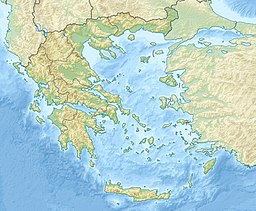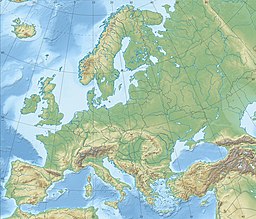Straits of Corfu
| Straits of Corfu | |
|---|---|
 The Corfu Channel or Straits located to the east of Kassiopi. The line demarcates the Greek-Albanian border. | |
| Coordinates | 39°46′N 19°58′E / 39.77°N 19.97°E |
| Basin countries | Greece |
The Straits of Corfu or Corfu Channel is the narrow body of water along the coasts of
Saranda, Albania, and Igoumenitsa, Greece, and by local and tourist traffic in Albania and from the Greek mainland to Corfu, in addition to some international traffic from the Adriatic.[2]
Corfu Channel Incident
The
People's Republic of Albania to the International Court of Justice.[6] Because of the incidents, Britain, in 1946, broke off talks with Albania aimed at establishing diplomatic relations between the two countries. Diplomatic relations were only restored in 1991.[7]
References
- ^ "World's Most Endangered Sites: Butrint, Albania". History.com. Archived from the original on April 23, 2008. Retrieved 2008-12-24.
- ISBN 978-0-7923-1141-6.
- ^ a b Australian Journal of Legal History Half Light Between War and Peace: Herbert Vere Evatt, The Rule of International Law, and The Corfu Channel Case
- ^ ISBN 978-0815340577. Retrieved 2008-07-31.
- ^ Times Online Obituary: Lieutenant-Commander Hugh Knollys Navigator who won a DSC on D-Day and survived when his destroyer hit a mine in the postwar Corfu Channel incident.
- ^ JSTOR The Corfu Channel Case Quincy Wright The American Journal of International Law, Vol. 43, No. 3 (Jul., 1949), pp. 491-494 (article consists of 4 pages) Published by: American Society of International Law Retrieved 31-07-08
- ^ UK in Albania (British Embassy in Albania) Archived 2008-09-26 at the Wayback Machine Quote: "Discussions on the re-establishment of diplomatic relations were finally broken off as a result of the Corfu Channel incidents. In May 1946 the Albanians fired on two Royal Navy Cruisers and in October 1946 two Royal Navy destroyers were damaged by mines with the loss of 44 men. Britain was awarded damages at the International Court of Justice in The Hague. Albania refused to recognise the judgement. In retaliation, Britain refused to permit the release of Albanian gold held since the War by the Tripartite Gold Commission." and "Post-War diplomatic relations were finally established on 29 May 1991"


